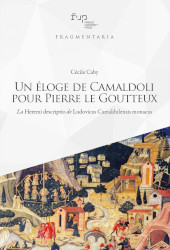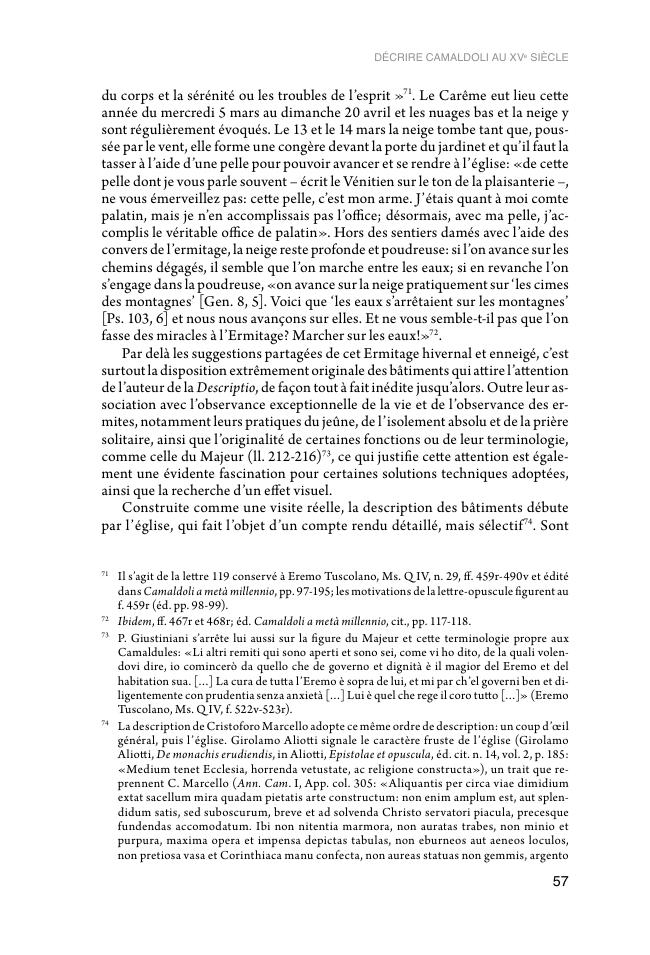Un éloge de Camaldoli pour Pierre le Goûteux : la Heremi descriptio de Ludovicus Camaldulensis monacus
110 p. : ill.
Includes bibliographical references (p. 97-106) and index.
The main object of this book is a manuscript preserved in Rome but composed in Florence in the middle of the fifteenth century, which transmits a text that is nearly unknown and highly original for at least three reasons. Firstly, the subject matter: a description of the Camaldoli hermitage at a time when this place was highly appreciated. Secondly, the discursive genre: the description of a built landscape, influenced both by humanist ekphrasis and by the tradition of medieval figurative exegesis. Finally, the dedicatee of the work, who is no less than Peter son of Cosimo dei Medici. The book successively examines the medieval and modern tradition of this little work, the identity of its author and the milieu of its production and first reception, and finally the details – some of them completely new – of the description of the Camaldolese hermitage and their textual and figurative tradition.
It concludes with a critical edition of the work and the glosses with which it was enhanced in modern times. It is therefore a contribution not only to the history of an important Tuscan monastic centre, but also to that of the cultural and political networks of Tuscany in the second half of the fifteenth century, as well as to the knowledge of the textual and iconographic genres of landscape and monumental description, and finally, in a certain way, of modern Tuscan scholarship.
Cécile Caby, after teaching at the universities of Nice and Lyon 2 – Lumière, is currently a Professor of Medieval History at Sorbonne University. Her research focuses on eremitism and monastic orders at the end of the Middle Ages (including the Camaldolese and the Olivetans), their relationship with the cities and their cultural practices. For several years now, she has worked to renew the study of the relationship between humanism and religious orders, particularly in Quattrocento Italy. [Publisher's text]
Ce livre a pour principal objet un manuscrit conservé à Rome mais composé à Florence au milieu du XVe siècle qui transmet un texte presque inconnu et très original pour au moins trois motifs. L'argument traité : une description de l'ermitage de Camaldoli à une époque de forte valorisation de ce lieu. Le genre discursif : la description d'un paysage bâti, influencée aussi bien par l'ekphrasis humaniste que par la tradition de l'exégèse figurative médiévale. Enfin le dédicataire de l'œuvre, qui n'est autre que Pierre le Goutteux fils de Cosimo dei Medici. Le livre examine successivement la tradition médiévale et moderne de cette petite œuvre, l'identité de son auteur et son milieu de production et de première réception et enfin les détails – pour certains absolument inédits – de la description de l'ermitage camaldule et leur tradition textuelle et figurative.
Il se conclut par l'édition critique de l'œuvre et des gloses dont elle a été enrichie à l'époque moderne. Il s'agit donc d'une contribution non seulement à l'histoire d'un important centre monastique toscan, mais aussi à celle des réseaux culturels et politiques de la Toscane de la seconde moitié du XVe siècle, ainsi qu'à la connaissance des genres textuels et iconographiques de la description du paysage et des monuments, et enfin, d'une certaine façon, de l'érudition toscane moderne.
Cécile Caby, après avoir enseigné dans les université de Nice et de Lyon 2 – Lumière, est actuellement professeure en histoire du Moyen Âge à Sorbonne Université. Elle poursuit des recherches sur l'érémitisme et les ordres monastiques à la fin du Moyen Âge (entre autres les Camaldules et les Olivétains), leurs rapports avec les villes et leurs pratiques culturelles. Depuis plusieurs années, elle s'efforce de renouveler l'étude des relations entre humanisme et ordres religieux, notamment dans l'Italie du Quattrocento. [Résumé par l'éditeur]
Piero di Cosimo de' Medici (1416-1469).
-
Informationen
ISBN: 9788855184533
REIHE



